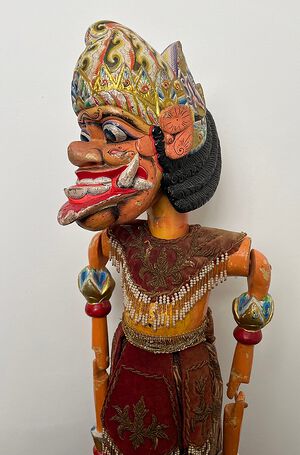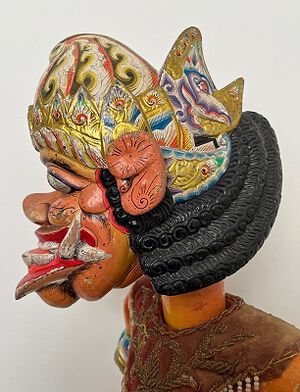Kala
| Title | Kala - (Batrara) - Mahabharata |
|---|---|
| Other names | |
| Size | 65 cm |
| Personal data | Betara Kala is a God, the son of Betara Guru and was born in the middle of the ocean. |
| Appearance | Betara Kala has large eyes, an arcuate nose with an open mouth. Bemarjam with an eagle on his back, God crouching, hair down, hair on the chest moving only the front hand, dressed in the kingdom of giants. |
| Collection | Private collection |
Kala - (Batrara) - Mahabharata
Betara Kala is a God, the son of Betara Guru and was born in the middle of the ocean.
Betara Kala was born as a blazing fire that could not be extinguished. All the gods used their magic to extinguish the fire, but in vain. All the weapons aimed at Betara Kala penetrated his soul and increased the power of the God. Then the fire turned into a monster of infinite size and the monster ascended to Suralaya (kingdom of the Gods) to ask who his father was.
Worried about a greater disaster happening, Betara Guru also confessed that the monster was his son. Then Betara Guru removed the magic from Betara Kala by pulling out the two balds of his son. These two calings were made into daggers and eventually became Pendawa's weapons. Therefore, the Javanese proverb talks about complaining about shouting Betara Kala, when someone uses a dagger weapon.
After the monster was recognized as a son by Betara Guru, he was given the name Kala with the title Betara meaning God, and was instructed to live in Nusakambangan and then marry Betari Durga.
Through Betara Guru, Betara Kala was given the power in this world to take people as victims, but the people who will be made victims must meet certain conditions and taking victims must not violate the prohibitions of the Gods.
According to faith, this world is full of prohibitions and taboos. The most important point of all this is that people should not hurt their fellow human beings physically and mentally and that people should show kindness to their fellow human beings.
Betara Uma also allows someone to become a victim of Betara Kala if, for example, that person violates the following prohibitions: 1. Put the kettle down when cooking rice;
2. Breaking the Pipsic Stone;
3. Groundbreaking;
4. Making a fence before the house is built; and others.
To prevent the arrival of Betara Kala, the Gods granted people a number of lotteries by pronouncing the writings found on Betara Kala's body, the pronouncement of which can weaken Betara Kala's magic.
The sound of writing is as follows:
Yamaraja jaramaya, jamarani rinumaja, yasiraya yarasia yasirapa parasia lawagna lawagni, sikutara sikutari, sikutaka si bintaki, sidurbala sidurbali, rumaya si rumayi, hudaya hudayi, srimaya gedah maya, dayudi si dayuda, hadayudi nihudaya
According to Javanese belief, a healing ceremony is also performed by playing the Murwakala puppet show.
The method is as follows: The play is played in the afternoon until the end of the story. Towards morning a story was told about a child being chased and about to be eaten by Betara Kala. But Betara Kala could be fooled with plain food and accepted it instead. When eating the food served, this is evident from feeding Betara Kala wayan rice.
After the condition of Betara Kala passes, the treated child is believed to have escaped and is in danger. The child being treated then puts the money into the paso filled with flower water, which action is followed by the audience who also wants to ask for blessings.
Time
By the people of Central Java, treatment wishes are carried out on a large scale in many ways, in the past there were many reasons for someone to fulfill treatment wishes and people did not feel satisfied if the wish was not fulfilled
There are several reasons to hold a ritual, including toppling a cauldron while cooking rice, breaking a millstone, and more.
Since there are so many types of taboos, as a metaphor it can be said that people should always be careful, so as not to make mistakes.
Batara Kala in Hinduism is the son of Lord Shiva and Goddess Uma. Batara Kala took the form of a giant with a scary face. In the Tattwa book, it is said that one day Lord Shiva and his wife Dewi Uma took a walk by the sea. Unexpectedly, Dewi Uma's cloth was exposed because the wind was blowing so that her calf was visible. Seeing this, Dew Siwaa's desire arose to invite Goddess Uma to have sexual intercourse, but the Goddess refused because such an act was not suitable for the Gods of heaven. Finally, the two of them returned to heaven, and Lord Shiva's kama water fell into the sea where it was later discovered by Lord Brahma and Vishnu. The seed was then created into a giant who growled and asked who his parents were. With instructions from Lord Brahma and Lord Vishnu, the giant found out that his parents were Lord Shiva and Goddess Uma. So the giant immediately went to heaven to ask for recognition from Lord Shiva. Before Lord Shiva recognized the giant as his son, he first had to cut off his long fangs so he could see the full form of his parents. These conditions were met, and finally Lord Shiva recognized the giant as his son, who was then given the title Batara Kala. Meanwhile, in another version it is stated that Batara Kala was the son of Btara Guru. It is said that one day before dusk, Betara Guru and Dewi Uma went to entertain themselves by riding Andini's ox in the sky to see the natural scenery. Accidentally, while above the ocean, the wind uncovered Goddess Uma's cloth. Batara Guru was tempted to see his wife's calves, he then seduced Dewi Uma and invited her to make love right then and there on the ox Andini's platform. However, Dewi Uma refused her husband's invitation because she felt that it was inappropriate. Batara Guru kept trying to seduce him, but Dewi Uma kept trying to avoid him. Finally, because she could no longer hold back her desire, Batara Guru's kama water (semen) came out and fell into the sea. Dewi Uma's rejection made Batara Guru upset and angry. They then argued. In a state of anger, Dewi Uma said that Batara Guru's actions were only worthy of being done by creatures with long fangs. What Dewi Uma said came true, Batara Guru's anger peaked after he realized his fangs grew longer. Batara Guru responded by cursing Dewi Uma to be a racist. Dewi Uma, who was already a monster by Batara Guru, exchanged her soul with Sang Hyang Permoni, who had a beautiful face but was jealous and spiteful. Goddess Uma was then given the title of Batari Durga. Meanwhile, when Batara Guru's semen fell into the sea, a child was born in the form of a very scary giant. The giant went to Jonggringsaloka's heaven and went berserk and asked for three wishes. The giant asked to be recognized as a child, given a name and given a wife. Batara Guru recognized the monster as his son and was given the name Batara Kala. Batara Kala was then mated with Goddess Uma who had become a monster called Batari Durga. The two were then placed in the heaven of Setra Gondomayit and controlled all kinds of jinn, gandharwa and other ethereal beings. When Batara Kala asked for food, Batara Guru gave food but determined, namely: 1. Ontang-anting child (only child/only puppet) 2. The Five Pandavas are all five sons and five daughters 3. Kedono-kedini, children are male and female. That is the food of Batara Kala who is commonly called Sukerta child (Java). Therefore, according to the beliefs of the Javanese community, to avoid the Batara Kala season, Sukerta children should be treated by holding puppet shows with Murwakala or Ruwatan plays.
Blog: Hadisukirno – Yogyakarta 2012


